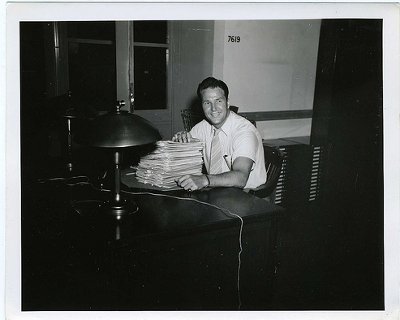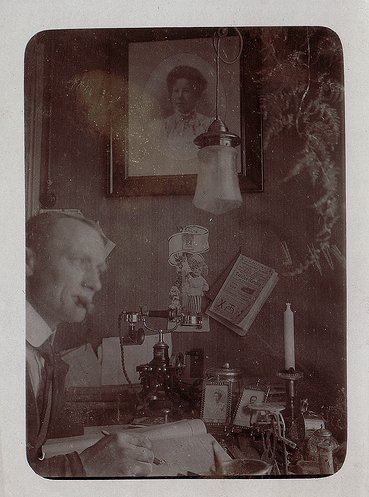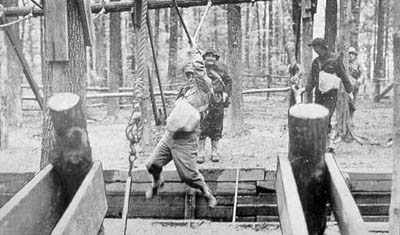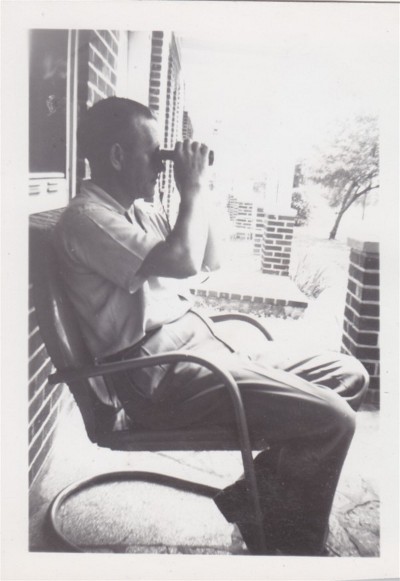
In Parts I and II of our series on vocation we talked about what a vocation is, and in Part III we put forth an argument for why every man should pursue his vocation. Today, we’ll be discussing how to find your vocation.
Your True Vocation=Your Gifts+Your Passion
As we’ve discussed so far, your calling is not one specific magical job out there, but rather your unique talents, gifts, and capabilities-the things within you that you bring to a job. Thus, different jobs can tap into your vocation to different degrees. A job may use your gifts 50% of the time or 90% of the time. Finding your true vocation means finding work that utilizes your gifts in the 75-100% range. How do you go about doing that?
I think this “formula” is helpful:
True Vocation=Your Gifts+Your Passion
You can be in a job where you get to use your gifts, but not use them for a purpose you feel passionate about. Or you can be working in an area you’re passionate about, but in a job that doesn’t employ your unique gifts. The ideal is to have a job that uses your talents in the service of something you’re passionate about. Here are some examples of what this could look like for a man:
- David’s gifts are for inspiring people and leadership, and his passion is for football. His true vocation might be becoming a football coach.
- Joe’s gifts are in teaching and researching, and his passion is history. His true vocation might be becoming a history professor.
- Dan’s gifts are in resolving disputes, and his passion is for making divorces more amicable for the partners and easier on kids. His true vocation might be becoming a divorce lawyer who concentrates on peaceful mediation.
- Alex’s gifts are in investigating things, and his passion is for animals and the outdoors. His true vocation might be becoming a game warden.
- Tyler’s gifts are in selling things and making deals, and his passion is for books. His true vocation might be becoming a literary agent.
- Blake’s gifts are in crunching numbers, and his passion is for politics. His true vocation might be becoming the state treasurer.
- Dave’s gifts are in language, and his passion is for Japan and Japanese culture. His true vocation might be becoming a translator in Japan.
You might be passionate about a cause, an area of the world, a sport, or a product. But you can also be passionate about a lifestyle or an ideal or a tradition. A man who has a gift for fixing things and working with his hands, might be passionate about the idea of craftsmanship and find his vocation as a carpenter. A man who has a gift for cutting hair, giving shaves, and offering easy conversation, and a passion for the tradition of barbering, should easily know what his vocation is! A man whose father and grandfather were police officers and who is passionate about carrying on the family tradition would do well to follow in their footsteps. A man whose gifts are in entrepreneurship and who is passionate about working at home might find his vocation in developing web projects. A man with gifts for leadership and courage and who is passionate about the ideals of country, service, and sacrifice might find his true vocation in the military.
Finding Your Birthright Gifts
Of course in order to use the above “formula,” you need to know the passions and capabilities to plug into it.
As we discussed in Part I, your “birthright gifts” are your unique talents, gifts, capabilities, and purposes-the seeds of things you were born to do. You may believe that the seeds were planted there by the chances of biology or purposefully by God. And they’re not so much things you seek as things you rediscover.
In Let Your Life Speak, Parker J. Palmer argues:
“Vocation does not come from willfulness. It comes from listening. I must listen to my life and try to understand what it is truly about-quite apart from what I would like it to be about-or my life will never represent anything real in the world, no matter how earnest my intentions…..Before I can tell my life what I want to do with it, I must listen to my life telling me who I am. I must listen for the truths and values at the heart of my own identity, not the standards by which I must live-but the standards by which I cannot help but live if I am living my own life.”
Trying to find your true life’s work without understanding what your birthright gifts are is like trying to grow a garden without any idea of what seeds have been planted in the soil. You wouldn’t know how to bring the seeds to fruition-how much water and sunlight the plants needed and how to care for them. Tending to the garden willy nilly would result in a barren harvest or plants that sprouted haphazardly and then quickly wilted away.
Finding your vocation thus means understanding exactly what seeds lie within you so that you are prepared to cultivate them to their fullest expression.
Tuning Into Your Signal
Your birthright gifts are like tiny radio transmitters that came buried within you when you were born and have been sending out signals ever since. As a kid you were probably very in tune with these signals-knowing what you liked and didn’t like came pretty easily.
But over time, the signal gets dimmer and dimmer, smothered by the increasing noise we’re bombarded with as we grow up. We pick up static everywhere we go-from the things we watch on tv, read in magazines, and hear from ministers, parents, and friends. Pretty soon our own signal, lost in a cacophony of voices, gets hard to hear.
Tuning back into this inner signal is the key to finding your vocation. Dr. Abraham Maslow argued:
“Recovering the self must, as a sine qua non, include the recovery of the ability to have and to cognize these inner signals, to know what and whom one likes and dislikes, what is enjoyable and what is not, when to eat and when not to, when to sleep, when to urinate, when to rest. The experientially empty person, lacking these directive from within, these voices of the real self, must turn to outer cues for guidance, for instance eating when the clock tells him to, rather than obeying his appetite…He guides himself by clocks, rules, calendars, schedules, agendas, and by hints and cues from other people.”
So much of our lives are dictated by external cues that we probably don’t even think about it. We wake up not when our bodies want to but when the alarm clock sounds. We eat lunch at noon and pizza while watching the game not because we’re necessarily hungry but because that is our company’s lunch hour and our game day ritual. We match our mood to the mood of whatever social group we find ourselves in. Our day’s activities come not from the heart but from a to-do list. There are men who if you gave them the day off to do whatever they wished, would be stumped as to how to fill the time.
Following some external signals is key to getting along in the world (showing up in a velvet jumpsuit to a job interview may be what your inner signal longs for, but it probably won’t land you the job). But they also end up distancing ourselves from who we actually are in areas of more importance than dress. Like your vocation.
Tuning into our inner signals need not mean traveling to India to study yoga at an ashram. It’s simply a matter of taking the time to carefully adjust our bunny ears until we hear the signal again loud and clear. This simply involves taking some time out for quiet moments of reflection.
As Palmer insightfully put it:
“The soul is like a wild animal-tough, resilient, savvy, self-sufficient, and yet exceedingly shy. If we want to see a wild animal, the last thing we should do is to go crashing through the woods, shouting for the creature to come out. But if we are willing to walk quietly into the woods and sit silently for an hour or two at the base of the tree, the creature we are waiting for may well emerge, and out of the corner of an eye we will catch a glimpse of the precious wildness we seek.”
Stop multitasking and filling your life with constant noise. Don’t look at your laptop while you eat; don’t turn on the radio the minute you get in the car; don’t read a magazine when you’re on the john. If you allow them space, the signals will come to you during your most ordinary activities, like washing the dishes.
Work on being honest with yourself about your motivations for doing the things you do. Do you really enjoy x,y, and z, or are you doing those things to please other people? You can do things for pleasure or do things out of obligation, but you should have the self-awareness to know when you’re doing which.
Pray. Meditate. Take walks without your ipod. Make time for activities that quiet and settle the mind.
Taking the time to tune into your inner signals will help your personal growth all around. To specifically hone in on the signal of your birthright gifts and passions, set aside some quiet time to just sit and think. I highly recommend getting out into the wilderness where you are sure not to be distracted. And then ask yourself these questions:
- As a boy, what did you love to do? Write? Read? Sports? Working on models? Playing with a chemistry set? Spending time outdoors? Pretending to be a solider or a spy?
- During school group projects, what job did other students assign to you, or did you volunteer for?
- What aspects of your current job do you love, which do you loathe?
- What kinds of projects and jobs at work and at home do you get excited about? What kinds do you dread?
- Have you ever talked to a friend about a topic, a dream, or an aspiration and everything just clicked inside of you, and you felt a surge of excitement throughout your body?
- What things do you see other people doing that make you ache with jealousy because you wish you were doing them?
- What issues get you really fired up?
- What dream has nagged at you for as long as you can remember, the thing that always pops into your mind no matter how many times you dismiss it?
- What fills your thoughts in the quiet moments when you’re riding the train or lying in bed? What do you think about incessantly, what captures your imagination? Politics? Spirituality? Relationships?
- If time, money, education and any other obstacle was a non-issue, what kind of work would you choose to do?
- What were you doing the last time you totally lost track of time?
I leave you to ponder on these questions. I think the answers will come clearly for most men. And I believe that most men know deep down what their calling is, what they really wish to do in life. The truly hard part is overcoming the obstacles and rationalizations we have for not following our callings. Explaining what these obstacles are will be the topic of the final part of this series.
_______________
Finding Your Calling Part I: What Is a Vocation?
Finding Your Calling Part II: The Myths and Realities of Vocation
Finding Your Calling Part III: Why Pursue a Vocation?
Finding Your Calling Part IV: Discovering Your Vocation
Finding Your Calling Part V: Obstacles to Embracing Your Vocation






